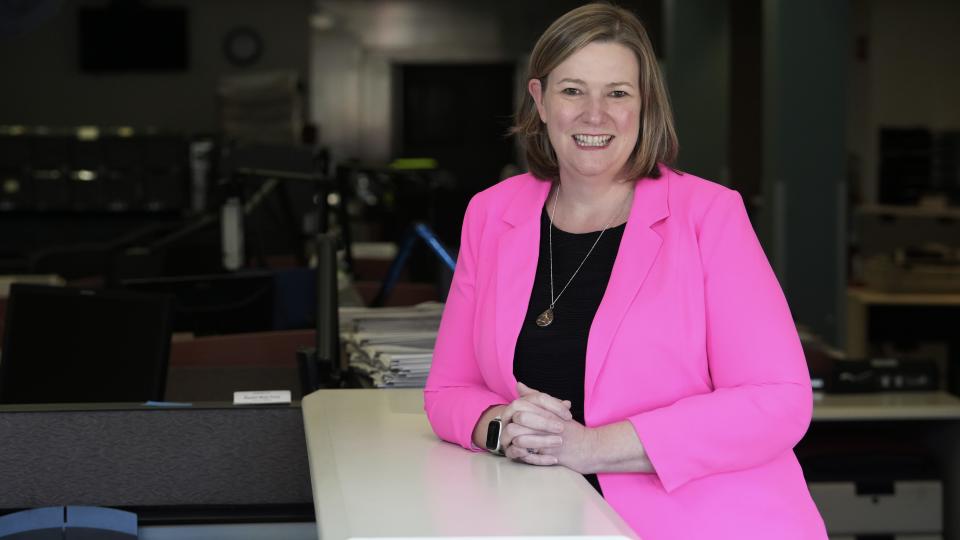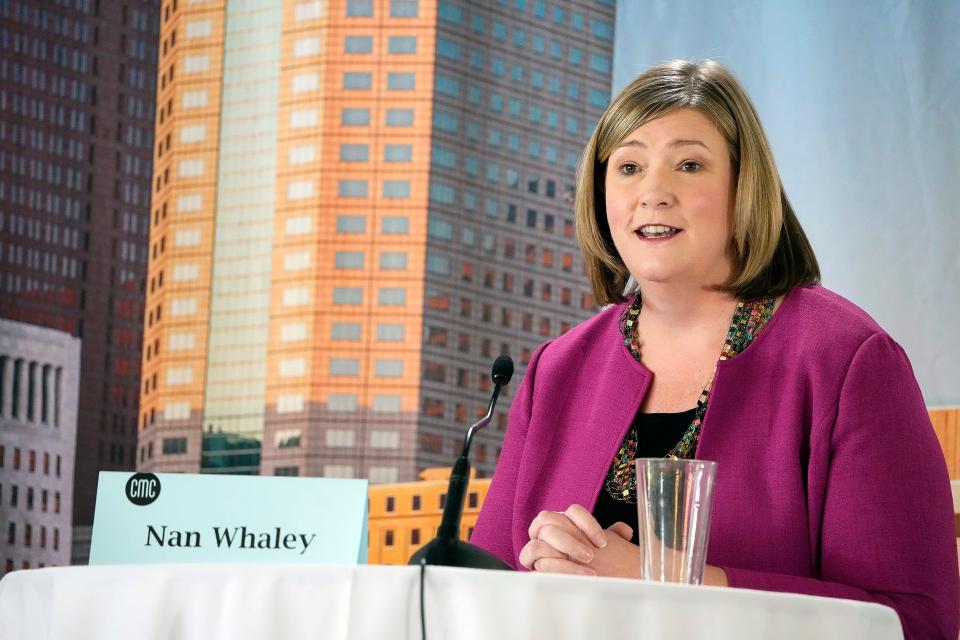Gov. candidate Nan Whaley: Mike DeWine 'terrified' of Ohio extremists, losing power
- Oops!Something went wrong.Please try again later.
- Oops!Something went wrong.Please try again later.
Note from Opinion Editor Amelia Robinson: Ahead of the May 3 primary, all major candidates for Ohio governor were invited to sit down with the Columbus Dispatch editorial board and other journalists from our newsroom and the USA TODAY Ohio Bureau.
Businessman Jim Renacci, a Republican, and Democratic primary candidates Nan Whaley, the former mayor of Dayton, and John Cranley, the former mayor of Cincinnati, agreed to share their thoughts.
Nan Whaley does not think Gov. Mike DeWine is strong enough to stand up for his own beliefs and at times signs laws he knows are bad for Ohioans and their futures.
That's one of many reasons Dayton's former mayor says she is running for the chance to replace him. Whaley is challenging former Cincinnati mayor John Cranley in the May 3 Democratic primary election.
"When it's politically convenient, (DeWine) says the right thing. But when it comes to taking action, he always goes with his radical part of his party. And I've seen that, on a very personal level on gun safety twice now — both on stand your ground and now it on (permit-less concealed carry). And I saw that on COVID, " she said.
More: Jim Renacci: Amy Acton 'scared the heck out of everybody'
More: John Cranley: Under Mike DeWine, Ohio's middle class is shrinking, young people unwelcomed
"He knows that he can't stand up to the extremists in his party. I think this is a really big issue for the state. We need someone that's tough and strong and isn't just going to fold because you're more worried about keeping their power."
Whaley was the mayor of Dayton during the 2019 mass shooting and tornadoes there as well as a Ku Klux Klan rally and opioid crisis that garnered national attention.
Sign up for our opinion newsletter
Email newsletter: How to get the Columbus Conversations newsletter
Tackling mental health and addiction
The 46-year-old says the state could do more to help alleviate the burdens of treatment of substance abuse disorders and mental health issues. Instead it has cut services.
More: Opinion: Coronavirus and opioid crisis create 'perfect storm' in Columbus
"They do a lot of lip service and no action. When I came in as mayor, we lead the nation in accidental overdose deaths due to the opioid epidemic. We brought the community together, tried to find a way forward. We cut accidental overdose deaths in half. We also sued the drug companies," she said. "We also said, how can we reach folks. Let's start treating addiction like a disease. So we have to take away stigma. And then we also have to have the right continuum of care, which is expensive. Local community in Dayton — Montgomery County and Dayton — put money into that effort."
Protecting the rights of Black, brown and LGBTQ communities
Since the outcry to declare racism a public health crisis two years ago, there has been backlash bills such as Ohio House bills 616 and 327 which opponents say target people of color, the LGBTQ community and the understanding of the roots of racism, sexism, homophobia and bigotry.
Whaley, the first in the state to officiate a same sex marriage, says she plans to be proactive for LGBTQ rights and attracting an inclusive workforce to the state. Dayton under her watch was among the first cities in the state in 2017 to ban gay-conversion therapy for youth.
More: Trans woman: Being scorned by adults an unfortunate 'rite of passage for people like us'
Following the murder of George Floyd, Whaley says she was intentional about addressing racism and working with community members.
She offered the following as examples: address racial disparities related to COVID and vaccines with Black community leaders, improving police relationships with members through dialogue and projects like Dayton's alternative response pilot program for 911 calls and assisting Black female preschool owners with business plans and teacher coaches.
Video: The Ohio statehouse bureau breaks down the May 3 primary
She says Mike DeWine has refused to address racism.
"There are three words that Mike DeWine won't say together and that's Black Lives Matter."
Marijuana
Whaley said laws against marijuana disproportionally impact Black people and Dayton was one of the first Ohio cities to to decriminalize it. Like many Americans, she once tried marijuana and thinks it should be legalized in Ohio. But she does not buy into the boom that Cranley projects as part of his economic plan.

"I don't think it's a panacea or a silver bullet to solve all our problems. If that was the case, these states – I think it's like what 26 states have passed it now – they would have no budget problems whatsoever and everything would be perfect," she said. "We've seen those sort of promises before like the lottery."
More: Smoke pouring from holes in Cranley's plans for legal marijuana in Ohio | Opinion
Education and Ohio's future
Whaley points out that she grew up in a working-class Indiana family and remains working-class.
"I think politics is getting really out of reach for a lot of people who work. I think it's indicative and everyone in this race is a millionaire, except for me," Whaley said. We have an opportunity to have someone that understands — lives in neighborhoods like most people live in — to govern our state."
Whaley's father was a union autoworker and her mother worked at a laundromat. She said she was able to pay for her education at the University of Dayton with the help of her parents, student loans and scholarships — something she says is impossible for many now due to the "exorbitant" cost of a college education.
Abortion
If successful, Whaley would be the first female elected governor in the state. She sees her gender as an advantage and discussed her intention to find solutions for the childcare crisis which has kept many women from returning to the workforce since the outbreak of COVID-19.
She also see her stance on abortion as a plus.
More: 'Our only option is to stay at home with our kids.' Child care crisis keeps moms from work
"I'm the only candidate in the race from any party that's pro-choice my entire career.
Mayor Cranley decided to announce he was pro-choice two months before he got in this race," she said. "I'm glad he's an ally, but this is too important considering that Roe V. Wade is likely to be overturned. The last place to stop to protect abortion access is the governor's office."
More: If abortion is banned in Ohio, seekers would have to drive 157 to 269 miles| Opinion
Spreading prosperity

Like Cranley, Whaley says the economic prosperity and population growth experienced by many in Columbus should also be spread to other places in the state.
More: Unions ready to rebuild middle class. Congress must help keep US edge over China |Opinion
Ohioans should be prepared to fill positions like those needed for the $20 billion Intel computer chip manufacturing plant planned for Licking County.
More: Cranley: DeWine, Republicans running young people from Ohio, making them uncomfortable
Things like improving the state's fragmented community college system, debt forgiveness for people who take jobs in certain sectors and apprenticeships should be explored deeper, she said.
The state must invest to prepare Ohioans for jobs of the future in fields like renewable energy and battery technology.
"We know that the car of the future is one that doesn't need an engine or transmission," Whaley told us. "The state can do a lot more investing in small business. Again the 'Intels' are great for a metro that's already winning. What are we doing for the smaller communities?"
Working across party lines
As Dayton's mayor, Whaley said she worked successfully with those with differing political views including conservative members of the city's chamber of commerce to get things done.
They didn't always agree with her, but Whaley said they always knew where she stood.
"That's really important that you have people that are willing to stand in their beliefs, but then willing to bring everyone together so we can get some sort of movement forward," she said. "I just don't think (DeWine) is willing to take the risk to do that because he is just terrified."
This piece was written by Opinion Editor Amelia Robinson on behalf of the Columbus Dispatch Editorial Board.
This article originally appeared on The Columbus Dispatch: Who is Nan Whaley, why is she running for Ohio governor?

